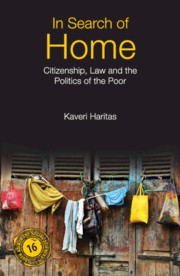3 - The Informal Market in Rehabilitation Housing
Published online by Cambridge University Press: 24 July 2021
Summary
In April 2012, M. Srinivas, the then MLA for Rararajeshwari Nagar, and Lakshmikanth Reddy, the Councillor of Laggere, stormed into the Laggere quarters with their supporters and broke open the locks of empty apartments, allowing their supporters to occupy them. This occupation also made it to the newspapers (Rao 2012) and television, as video footage of people storming into the buildings and breaking open locks were disseminated widely by residents in the area through their telephones. According to news reports, 250 homes were occupied, but the KSDB put the total number of homes occupied at 640. When I visited Laggere again in late 2012, Geethamma, a local leader who managed the water taps close to these new apartments, told me that many of those who had occupied the homes were really poor and needed housing, while the remaining were locked up to be sold later in the market. Those who had locked up their homes had moved furniture into it and occasionally visited the area, to give it the semblance of being occupied. Many were trying to sell these homes and the going rate was INR 250,000. With an air of disapproval, she told me that many other residents in the area had taken advantage of this occupation and had occupied homes. This included Ratnamma, a loud stocky widow who was an active supporter of the local councillor, Lakshmikanth Reddy, who had taken two homes for her daughters. Lakshmamma resided in one of the old buildings in the area constructed in the 1980s. As discussed in Chapter 2, these old homes were dilapidated and the KSDB had started making preparations for their demolition and reconstruction. Lakshmamma who had been served a notice to vacate her home had been negotiating with the KSDB for extra homes for her children in the bigger apartment that would take the place of her building post demolition.
This forcible occupation of homes did not come as a surprise to me, as hostility between the elected representatives in Laggere and the KSDB had been building up for many years. During my first interview with the local councillor, he had accused the KSDB of being a corrupt institution that worked closely with Dalit leaders, allotting homes in exchange for bribes.
- Type
- Chapter
- Information
- In Search of HomeCitizenship, Law and the Politics of the Poor, pp. 67 - 106Publisher: Cambridge University PressPrint publication year: 2021



